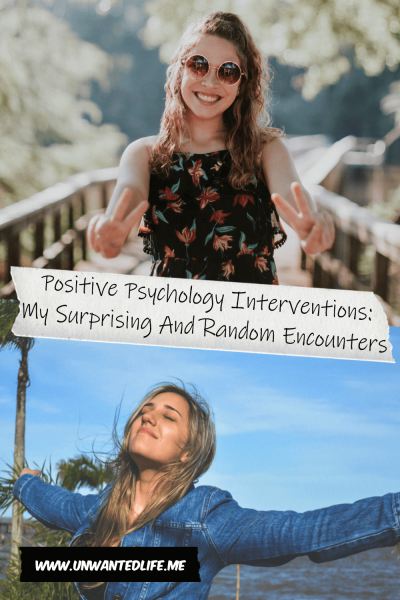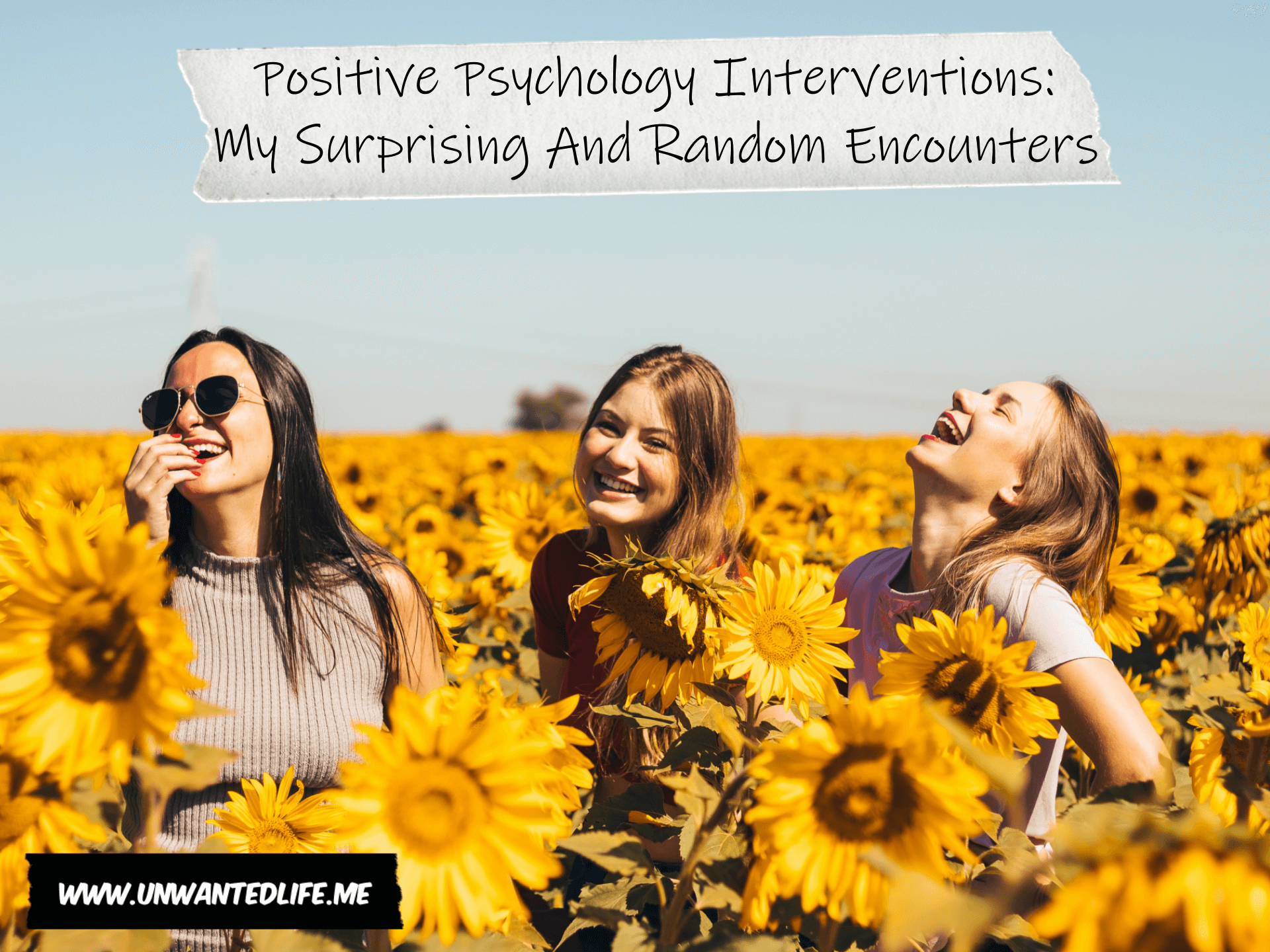If you’ve read my other article, then you’ll be aware that I wrote my first article about a psychological theory. You might have even picked up a few clues as to why I picked that theory to talk about. Well, if you were interested in knowing why, or I’ve now piqued your interest in knowing why, then this is the article for you. This article is about my encounters with positive psychology interventions.
During my postgraduate course, I was introduced to a new approach to psychology: positive psychology. At first, I just dismissed it as pseudo-psychology, or woo, akin to pop psychology and the self-help genre. How could I not? Even the name of the theory screams marketing con job. However, I soon changed my mind during the process of teaching myself the subject.
I pride myself on my ability to change and adapt my views if there’s evidence to support my changing them. This was one of those times. Some people can stick to their guns regardless of the evidence, but it’s an important part of life to be able to change your views if the evidence changes. This is what I consider being open-minded to mean.
Whilst teaching myself the subject, I realised that I’d encountered brief attempts to use positive psychology in my previous work at a substance abuse charity. They had forms that would ask what strengths the clients thought they had in an attempt to get the practitioners and clients to somehow then use the strengths to come up with solutions to reach the client’s recovery goals.
Unfortunately, no training was given on how to use these strengths to improve recovery outcomes. Thus, most practitioners just followed the same cookie-cutter approach to treatment. This was a wasted opportunity to tailor treatments to the clients as individuals. This meant that the strengths the clients listed were only really used as a one-off dose of encouragement along the lines of, “See, you are good at something”.

Furthermore, due to the cost-cutting, the industry is constantly suffering from you have little to no time to work with your clients one-to-one: it’s cheaper to only do group work. This stops you from even trying to use your client’s strengths to better aid them in reaching their recovery goals.
While I was working at this charity, I tried to implement aspects of positive psychology, albeit unknowingly at the time. It wasn’t until I was teaching myself the subject that I realised I had been trying to implement aspects of three positive psychology interventions: participating in enjoyable and meaningful activities, best possible self (accomplishments), and best possible self (accomplishments), through trying to help my clients find healthy replacement activities to keep them busy.
I had wanted to contact local colleges and adult education centres to arrange taster sessions for the classes they run. Then have these taster sessions done at our service so our clients can try them out. This would have given our clients the chance to find hobbies they enjoy doing in their free time, and/or help them to reengage with education. However, my suggestion wasn’t followed through, unfortunately. Which seems like a wasted opportunity and a disservice to supporting our clients back to a healthy lifestyle.
I also tried to organise day trips for the clients, which they could earn a place on as a reward. But this had the plug pulled before it was completed due to funding problems. This was a letdown for both the clients and me because it would have helped them adjust to doing things with people without using substances reinforcing their recovery goals.
Basically, my ideas were tapping into ‘hope’ which would allow them to see what they could do first hand instead of using substances, rather than simply talking about it. It also would have given them something to aim for, by showing them how life can and will be different for them if they just stick to reaching their recovery goals.
What is surprising is that I’ve not come across positive psychology whilst seeking or getting help from my own mental health. This seems a little odd. Mind often uses elements of positive psychology, and substance abuse charities are trying to find ways to introduce it into their treatment programmes, so why aren’t the NHS and their Mental Health Trusts?
If done right, the use of positive psychology interventions could be a useful tool to go alongside other forms of therapy. These interventions could also be used as homework tasks between sessions, to help people stay engaged in supporting their mental wellbeing. Thus, using a combination of the two or picking one over the other, depending on the circumstances, could be beneficial to someone in therapy.
As always, leave your feedback in the comments section below. Also, have any of you come across positive psychology and positive psychology interventions whilst engaging with your mental health treatment, or have you encountered positive psychology in other aspects of your life? Let me know in the comments section below as well. If you want to stay up-to-date with my blog, then sign up for my newsletter below. Alternatively, get push notifications for new articles by clicking the red bell icon in the bottom right corner.
Lastly, if you’d like to support my blog, then you can make a donation of any size below as well. Until next time, Unwanted Life readers.


I wholeheartedly agree! Great post!!
thank you
Its like you read my mind! You appear to know so much about this, like you wrote the book in it or something.
I think that you could do with a few pics to drive
the message home a little bit, but other than that, this is magnificent blog.
A fantastic read. I will certainly be back.
adding some pictures would be a good idea, I might try to find some for it later
Greetings – I appreciate any attempt to make psychological therapy more relevant to each individual client as opposed to a cookie-cutter approach. I’ve seen both methods, firsthand. Sounds like you (at the very least) have endeavored to demonstrate positive real-life experiences can replace the many negative outcomes associated with substance abuse. Good luck with your efforts. —> Hunky the Centaur
(Oh, I was a bit confused by your three positive psychology interventions. Were 2 and 3 meant to be the same? I might’ve missed something there. —> Hunks)
hi, do you mean on my previous post, https://unwantedlife.me/positive-psychology? They are slightly different, number 2 reflects your general accomplishments and number 3 reflects your social relationship and the improvements you’d like to make to them
I love that you had the chance to give others a hand in their mental health troubles. I find it even more interesting to read this having just come off from reading a paper my aunt wrote on positive psychology! Ultimately, it is up to individuals to come to the classes and/or interventions, but getting word out there is a good step to letting people know they are not alone.
Thanks so much for sharing your experiences!
Thanks, I should get that changlce again soon if my placement works out
it’s interesting how many people discover positive psychology after treatment. It really makes you think about the timing of these interventions
Thanks for commenting
A wonderful collection of articles. I really like it. It’s very helpful for everyone